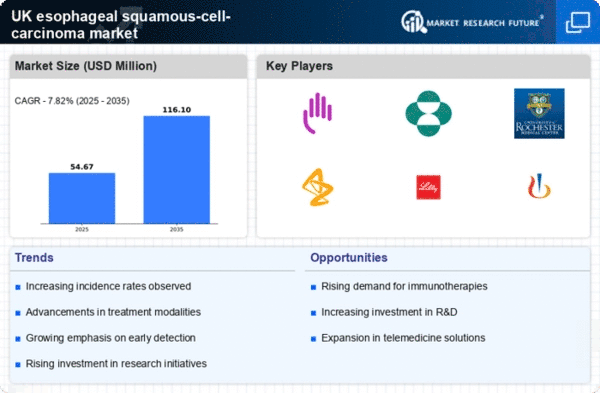Increasing Incidence Rates
The rising incidence rates of esophageal squamous-cell-carcinoma in the UK are a primary driver for the market. Recent statistics indicate that the age-standardized incidence rate has increased, with approximately 8,000 new cases diagnosed annually. This trend is likely influenced by lifestyle factors such as smoking and alcohol consumption, which are prevalent in the UK. As awareness of the disease grows, healthcare providers are expected to enhance screening and diagnostic efforts, thereby increasing demand for treatment options. The esophageal squamous-cell-carcinoma market is poised to expand as more patients seek intervention, leading to a greater need for innovative therapies and supportive care. This increase in incidence not only highlights the urgency for effective treatment solutions but also underscores the importance of ongoing research and development in the field.
Rising Awareness and Education
Rising awareness and education regarding esophageal squamous-cell-carcinoma are pivotal in driving the market forward. Public health campaigns and initiatives aimed at educating the population about risk factors and early symptoms are gaining momentum in the UK. This increased awareness is likely to lead to earlier diagnosis and treatment, which can significantly improve patient outcomes. Healthcare professionals are also receiving enhanced training on recognizing the disease, further contributing to timely interventions. As a result, the esophageal squamous-cell-carcinoma market is expected to benefit from a surge in demand for diagnostic and therapeutic services. The emphasis on education not only empowers patients but also fosters a more proactive approach to managing this aggressive cancer type.
Emergence of Personalized Medicine
The emergence of personalized medicine is transforming the landscape of the esophageal squamous-cell-carcinoma market. Tailoring treatment plans based on individual genetic profiles and tumor characteristics is becoming increasingly feasible, thanks to advancements in genomic testing. This approach allows for more effective targeting of therapies, potentially leading to better patient outcomes. In the UK, the integration of personalized medicine into clinical practice is gaining traction, with healthcare providers recognizing its potential to optimize treatment efficacy. As more patients receive tailored therapies, the esophageal squamous-cell-carcinoma market is likely to expand, driven by the demand for innovative solutions that address the unique needs of each patient. This shift towards personalized care represents a significant evolution in the management of this challenging cancer type.
Government Initiatives and Funding
Government initiatives and funding play a crucial role in shaping the esophageal squamous-cell-carcinoma market. The UK government has been actively investing in cancer research and treatment programs, with a focus on improving healthcare infrastructure and access to innovative therapies. Recent funding allocations have aimed to enhance early detection and treatment capabilities, which are essential for improving survival rates. This financial support is likely to stimulate growth in the market, as it encourages the development of new treatment options and technologies. Additionally, collaborations between public health organizations and private sectors are expected to foster innovation in the esophageal squamous-cell-carcinoma market, ultimately benefiting patients through improved care pathways.
Advancements in Treatment Modalities
The esophageal squamous-cell-carcinoma market is significantly influenced by advancements in treatment modalities. Recent developments in surgical techniques, radiotherapy, and chemotherapy have improved patient outcomes and survival rates. For instance, minimally invasive surgical approaches have gained traction, allowing for quicker recovery times and reduced hospital stays. Furthermore, the introduction of novel chemotherapeutic agents has expanded the therapeutic arsenal available to oncologists. In the UK, the market for these treatments is projected to grow, with an estimated value reaching £1 billion by 2027. This growth is driven by the increasing adoption of these advanced therapies, which are becoming standard practice in managing esophageal squamous-cell-carcinoma. As clinical trials continue to yield promising results, the market is likely to see further innovations that could enhance treatment efficacy.
















